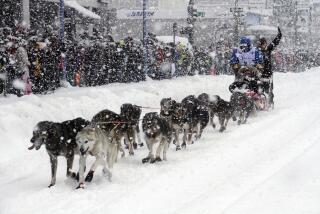Iditarod dog dies after frigid night outside; charges are urged
- Share via
CRAIG, Alaska — Animal rights activists on Tuesday called for criminal charges against those responsible for the death of a sled dog who was left outside in bitter cold overnight during Alaska’s Iditarod.
The death of 5-year-old Dorado is the first in four years for the 1,049-mile annual race between Anchorage and Nome, a grueling endurance contest that is run through some of the harshest snow, ice and wind conditions on Earth.
The 55-pound dog had been dropped from its team at the town of Unalakleet and was one of about 135 scratched dogs awaiting transport back to Anchorage. Most of the dogs were housed inside a pair of airport buildings, but Dorado was among about 35 dogs left outside Friday night in freezing, blowing snow. Temperatures plunged to minus 15 degrees and winds reached 45 mph.
The dead dog was discovered the next morning, asphyxiated under a snowdrift. Race organizers said it had last been checked about 3 a.m.
“Between that time and daylight, drifting snow covered several dogs and Dorado was found to be deceased,” race organizers said in a statement. “The entire Iditarod family is mourning this loss.”
The animal rights group People for the Ethical Treatment of Animals sent a letter to the district attorney in Nome on Tuesday, urging that criminal charges be brought under animal cruelty laws.
“It would appear that [the dog owner] and any Iditarod organizers responsible for Dorado’s safety can be directly blamed for this animal’s horrific death,” the organization said.
An official said charges would be difficult to file because of exemptions in the state’s animal cruelty law.
Owner Paige Drobny, who operates the Squid Acres mushers sled dog kennel in Fairbanks, apparently relied on race workers to care for the dog and continued on with the rest of her team to the finish line in Nome.
“Dorado had been pretty stiff on the previous two runs and not moving as smooth as the rest of the team, so she decided to drop him,” Drobny’s husband, Cody Strathe, said in a blog post on the kennel’s website.
“We thought that our dog was being cared for,” Strathe, who is also a musher, told the Anchorage Daily News. “That’s the race organization’s responsibility. We, as mushers, trusted them.”
Strathe said he hopes the investigation will lead to better protocols for handling such dogs.
With the late sunrise in the far north, the dog theoretically could have gone six hours without being checked on. Race organizers, who did not return a phone call, have said that an unexpected storm made caring for the dogs more difficult than anticipated, but that most should have been able to hunker down safely in the blowing snow.
Nome District Atty. John Earthman told the Los Angeles Times that animal cruelty laws in Alaska exempt dog-mushing competitions.
Any attempt to bring criminal charges, he said, would require proving that someone was guilty of criminal negligence.
“That means it can’t just be an accident. An accident’s not a crime. Criminal negligence basically requires that you engage in conduct that’s a gross deviation from what other reasonable people would do under the circumstances,” he said.
All over Alaska, sled dogs routinely are left outside in harsh conditions, often tethered with a short chain to a small doghouse.
“To Alaska jurors, especially in western Alaska, the weather out here in the winter can be very, very bad. And the local practice, and this includes excellent sled dog handlers, is these dogs usually spend the winter outside,” Earthman said. “These sled dogs do just fine in weather conditions that folks in the Lower 48 would find simply horrific.”
He said he would evaluate the situation and decide whether any charges were warranted.
ALSO:
For Bloomberg’s next trick, making cigarettes disappear
Supreme Court issues major copyright ruling on foreign sales
Florida student may have plotted dorm massacre before suicide
More to Read
Sign up for Essential California
The most important California stories and recommendations in your inbox every morning.
You may occasionally receive promotional content from the Los Angeles Times.













